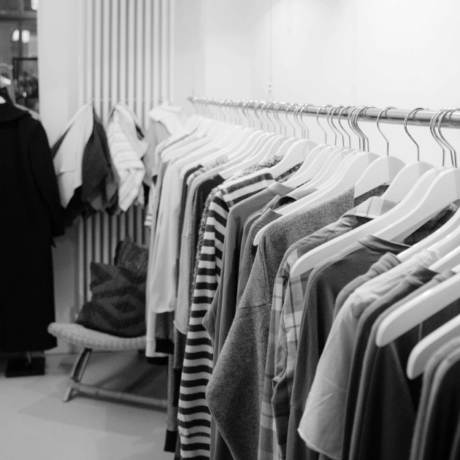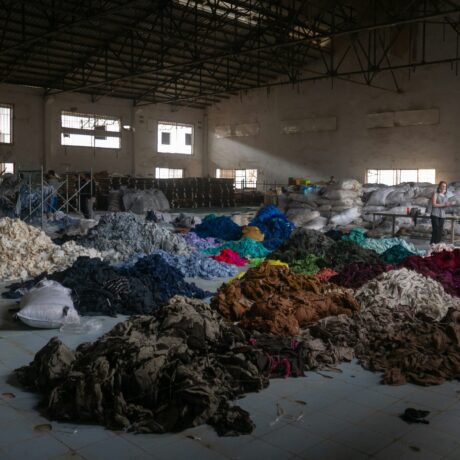Strengthening the New York Fashion Act
New York lawmakers are taking the lead in transforming the fashion industry through legislation, introducing the Fashion Sustainability and Social Accountability Act (the Fashion Act). The bill aims to hold major brands and retailers that operate in New York State accountable for their environmental and social impacts, from their carbon emissions and the wages they pay to garment workers to their human rights harms. However, the first draft of the bill lacks the language necessary to truly hold brands accountable for their behaviour.
In an effort to strengthen the potentially game-changing bill, Remake, with the support of 19 other organisations, sent this letter of proposed amendments to the Fashion Sustainability and Social Accountability Act to elected officials on Friday, January 14, 2022.
Fashion Revolution USA also co-signed this important letter, with Policy Manager Nikki Eclarinal and the team working hard to interpret the bill and coordinate responses as part of the coalition of allies in the fashion and sustainability space.
“To address the urgent challenge of the climate crisis, Fashion Revolution USA, along with a coalition of other human, environmental, and labor organizations, believe the Fashion Act should include clearer avenues and pathways for liability against brands and retailers for their actual social, human, and environmental harms,” shares Policy Manager Nikki Eclarinal. “And like CA’s SB62, we also hope that the bill will be amended to include stronger protections and investment for the industry’s NY garment workers. We believe that sustainability and industry regulation must continue to prioritize human rights to ensure workers and people are treated with dignity.”
To: State Senator Alessandra Biaggi, Assemblywoman Anna R. Kelles
From: Remake; International Corporate Accountability Roundtable; Business & Human Rights Resource Centre; Human Rights Watch; California College of the Arts; Sarah Dadush and Olivia Windham Stewart, Director & Deputy Director of Rutgers Law School Business and Human Rights Law Program; Asia Floor Wage Alliance; PayUp Fashion; Custom Collaborative; Fashion Revolution; Sustainable BK; Fashion Revolution USA; Fibershed; New York Textile Lab; The Center for the Advancement of Garment Making; The Fashion Connection; Conscious Chatter; The OR Foundation; War on Want
Dear Senator Biaggi and Assemblywoman Kelles,
We congratulate you on the unveiling of New York’s Fashion Sustainability and Social Accountability Act (The Fashion Act), and the press conference that you held on Friday, January 7th, 2022. We wholeheartedly agree with you that it’s time to take strong action to make fashion more ethical, sustainable and accountable and for New York to lead the way.
As a coalition of labor and human rights advocates and organizations working closely on issues connected to the fashion industry, we are concerned that this bill falls short of what is needed to protect people and the environment from the multiple harms caused by the sector. As such, we are writing to request considerations to strengthen the Fashion Act via a range of amendments.
Our primary concern is that the Fashion Act focuses primarily on disclosure. As such, brands will only be held accountable for failures to report, not failures to actively identify, prevent, mitigate and account for adverse impacts on people and planet on an ongoing basis, as set out by the UN Guiding Principles and OECD Guidelines and Guidance. It furthermore places no requirements on companies to provide for or cooperate in remediation for harms they cause or contribute to where appropriate. Liability, likewise, is only for failure to report. As it stands, this renders the Fashion Act far weaker than recent legislation passed in California (SB62), France and Germany and puts New York behind instead of ahead of the curve.
We know from failed policies like the UK Modern Slavery Act that disclosure bills often do not drive corporate accountability or protect human rights and the environment. While collecting the information outlined in the bill may be useful for civil society, that information does not easily or directly translate into direct improvements in the lives of garment makers and their communities or work to reduce environmental destruction. As currently written, the bill would allow brands and retailers to report limited to no progress on their climate change or human rights goals, for example, and be in compliance.
To address these issues, we strongly encourage you to gather more stakeholder input when amending this bill, from this coalition and beyond. In particular, before moving forward, we implore you to consult more closely with the most affected communities, as well as labor rights and environmental organizations, including unions in the U.S. and globally.
As a coalition of labor, human rights and sustainability organizations, educators, and advocates focused on building a more just and accountable fashion industry, the Pay Up Fashion Coalition and our allies who are signatories to this letter are seeking amendments to strengthen the bill’s text. We believe these amendments will significantly advance Assemblywoman Kelles’s stated objective to passing legislation that “focuses not just on reporting but accountability and enforcement.”
We would welcome a meeting with your office to discuss important initial recommendations for amendments, including:
PayUp Fashion Coalition and Allies Suggested Amendments to New York’s Fashion Sustainability and Social Accountability Act (The Fashion Act / S7428 / A8353)
Strengthened labor data
The current labor disclosure data needs to be expanded and strengthened. Data requests in the bill such as – information on measures taken to embed responsible business conduct into policies and management systems and the actions taken to prevent or mitigate those risks, such as corrective action plans, to be cited where available, including estimated timelines, targets and benchmarks for improvement and their outcomes – rely on brands and retailers self-reporting and setting their own targets, which has stalled progress on human rights for over thirty years. We propose collecting metrics that are more in line with what labor leaders and human rights experts recognize as useful. Some examples include:
- Disclosure of Tier 1, Tier 2, Tier 3, Raw Materials, and Reverse Logistics suppliers in a publicly accessible and usable format
- Tier 1 factory data for 100% of supply chain, including name and address, parent company, product type, and number of workers (less than 2,000; 1,000-5,000, etc.) and by country, value and volume and information on working conditions including:
- Average monthly wages by job and payment type (salary, bonus, overtime, etc.) by country
- % of workers who are migrants
- % of unionized factories and bargaining agreements, union name and density
- Audit findings by firm (and aggregate by country) showing average number of violations by category (hours, wages, safety, recruitment, child labor etc).
- Hours worked weekly by month and overtime by firm and country
Section 4C(v)should be amended to acknowledge that brands’ and retailers’ own purchasing practices can significantly influence human rights outcomes and contribute to adverse human rights impacts. Instead of asking companies to report on their approach for incentivizing supplier performance on workers’ rights, the bill should require that brands and retailers report on the following:
- Do the brand’s or retailer’s commercial practices ensure the suppliers’ ability to provide workers with a living wage and decent work?
- Does the business ring-fence labor costs that make living wages possible in cost negotiations for all orders or pay additional living wage contributions on every order placed, as per the Wage Forward campaign?
- Does business conduct reward suppliers for safeguarding workers’ rights (example: higher prices, repeat business, higher value)?
- Is there a public commitment to set prices high enough to cover investments in sustainability, decarbonization and water and energy efficiency, safety and other compliance demands at the supplier level?
- Do contracts place at least 30% upfront payment in orders, to even out the risk between buyers, suppliers and garment workers? And is final payment completed within 30 days of delivery?
- Is there a responsible exit policy and commitment to pay for orders in production upon cancellation?
- Is there a policy in place to never ask for discounts on orders after a contract is negotiated?
- Are the company’s commitments on the above matters reflected in their supply contracts?
- Does the company publicly commit to address concerns and grievances in a manner that prioritizes the human rights of supplier factory workers?
- Do the company’s supply contracts provide that, in the event of an adverse impact, victim-centric remediation will take priority over traditional (inter-party) contract damages?
Companies must perform rather than report on due diligence.
The bill does not as worded ask companies to perform due diligence; it asks them to report on due diligence procedures. What’s more, it does not sufficiently hold brands and retailers accountable. The current accountability section includes penalties for failures to report on impacts, goals, and due diligence, but does not include any penalties for harm caused by, contributed or linked to a brand or retailer, or for failing to meet the targets that brands and retailers set. That means brands and retailers could, for example, set climate change or waste reduction goals and goals to pay a living wage, market their commitments to NY consumers, never meet them, and still be in compliance. This places the bill far behind mandatory human rights due diligence (mHRDD) legislation passed in France (Duty of Vigilance), Germany and Norway, legislation currently under consideration in the EU, and California’s Garment Worker Protection Act. For progress to be made, we must hold the industry accountable for due diligence failures and for harms that companies cause or contribute to. For example, in France, advocates have been able to use their mHRDD law to file complaints against an oil company for failing to meet its emissions reduction targets. Such accountability would not be possible under the Fashion Act as currently drafted. To address this gap we propose the following amendments to the bill:
Companies must perform environmental and human rights due diligence Companies should not just report on due diligence processes. They should be required to actually perform due diligence on their supply chains, including identifying, preventing, mitigating, and accounting for potential adverse impacts, in line with the OECD guidelines and UNGPs.
Clear liability on brands and retailers for harms caused not just a failure to report
In line with France’s Duty of Vigilance Law and the European Parliament’s blueprint for a due diligence directive, the bill should be amended to include civil liability not just for a failure to report on impacts but for human rights and environmental harms caused or contributed to through brands’ and retailers’ own operations (via subsidiaries) across the whole value chain, including all direct and indirect business relationships, upstream and downstream.
Joint liability on brands and retailers for wage theft
In line with the California Garment Worker Protection Act (SB62), a joint liability clause that holds both brands/retailers and manufacturers accountable for wage theft in their supply chain and minimum wage violations for New York state’s 10,000 garment workers should be added in the bill. As written, there are no incentives or protections for New York’s own manufacturing base. Expanding this protection to workers in the international supply chain in alignment with labor unions work across Asia is strongly recommended.
Remediation for garment and supply chain workers
The community fund outlined in the bill gathers fines for failure to report on human rights and environmental impacts globally. The draft bill indicates that community funds would be directed to supporting environmental justice efforts in NYC. This is not in keeping with international human rights standards, which require that funds collected for business human rights failures go back to victims themselves:
- Whether for environmental or human rights harms, remediation should be understood broadly, to include money damages, where appropriate, and reparative or injunctive relief, where appropriate.
- As concerns the former, non-compliant companies should be ordered to channel money remedies to victims, wherever they may be in the world and wherever they may be located within the supply chain.
- As concerns the latter, non-compliant companies should be ordered to clean up or offset whatever environmental damage they have caused or contributed to, wherever it may have occurred, and to stop engaging in conduct that causes or contributes to adverse impacts and take concrete measures to prevent the occurrence or reoccurrence of adverse impacts.
These proposed amendments would vastly strengthen the bill and increase its chances of having a meaningful positive impact on workers’ lives and reducing fashion’s outsized impact on our climate. We look forward to speaking to you further about these recommendations.
**We acknowledge that this set of recommendations is not comprehensive. There are many other stakeholders whose voices must be considered.**
Sincerely,
Remake, International Corporate Accountability Roundtable, Business & Human Rights Resource Centre, Human Rights Watch, California College of the Arts, PayUp Fashion, Custom Collaborative, Fashion Revolution, Sustainable BK, Fashion Revolution USA, Fibershed, Textile Lab, The Center for the Advancement of Garment Making, Fibershed, the Fashion Connection, Conscious Chatter, the OR Foundation

![]()







![]()
















